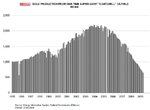I didn't take your post out of context and wasn't having a go. I realised you were putting a fair point across as China has contributed (I think 70%- can't remember where I read that) towards recent oil demand.
At the moment though, I am watching the U.S. very closely to see if China etc can really continue to grow. Since the start of the credit crisis, around 15 trillion has been wiped from U.S. wealth (according to FED website). The recent articles we are seeing about credit drying up, money supply shrinking, unemployment etc will put a drag on consumers and business, affecting China's exports business. China currently makes 40% of its GDP from exports, so if this starts to dry up then China will have to cut back on spending.
Since the U.S. lifted the gold standard in '71 they have printed trillions of dollars, which China and the rest of the world has benefited from but I feel they might be running out of headroom to continue this. China's GDP is 4 trillion and they have 2 tn of reserves. It sounds a lot but if the US stops printing money and the global economy deflates, China will feel the crunch.
This will expose their inflated stock market and also property (4 Chinese cities are in the top 10 of avg home sales price- how ridiculous is that for a nation with 3000 gdp per capita).


